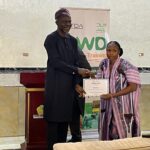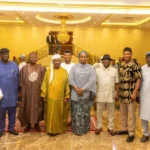By Emmanuel Oloniruha/Aderogba George
Mrs Busola Ajibola, a Deputy Director at the Centre for Journalism, Innovation and Development (CJID), has called for clear policies to regulate the use of Artificial Intelligence (AI) in Nigeria.
Ajibola made the call on Tuesday in Abuja at a capacity-building workshop for members of the Nigeria Union of Journalists (NUJ), Federal Capital Territory (FCT) Council.
The one-day media training, themed “Harnessing Artificial Intelligence in Journalism in Nigeria”, was organised by the NUJ FCT Council in partnership with Chevron Nigeria Limited.
She urged journalists to lead national conversations on the urgent need for policies and regulations around AI.
“Whether we like it or not, AI has come to stay, and it will continue to impact lives in unprecedented ways,” Ajibola said.
She stressed the need for regulations to protect the information ecosystem against threats such as data theft, disinformation, and other risks posed by AI.
“While we continue to leverage the benefits that AI offers, like understanding our audience better or improving revenue, we must be mindful of the challenges it poses to media integrity and journalistic credibility,” she added.
Ajibola warned that AI was increasingly being used to undermine the information space, which could have serious implications for democracy if left unchecked.
“If journalists do not rise to the occasion to protect information integrity, we will witness a degeneration of democratic values.
“It’s critical for journalists to be equipped with tools to combat mal-information, misinformation, and disinformation, all forms of information disorder,” she said.
She also highlighted how deepfake technology could mislead the public, especially during election periods, by circulating fake videos of politicians saying or doing things they never did.
“If the media is not equipped to discern between fake and authentic content, it will be difficult to maintain public trust,” she warned.
Ajibola further raised concerns about surveillance and ethical data use, pointing out that AI systems were largely built on data generated by individuals through devices and online activities.
“There’s a big question about how these data are being used and who should be the custodian.
“Some platforms now enable people to use AI to undress women digitally, this raises serious concerns around safety and consent,” she said.
She emphasised the role of the media in asking critical questions around accountability, privacy, and ethics in AI development and usage.
“Children are already using AI tools like ChatGPT on their phones and tablets. The question is: how do we ensure safety and ethical usage?
“Journalists must be on the frontline of this conversation.”
Ajibola encouraged journalists to empower themselves with AI tools and knowledge to enhance their work but urged caution and responsibility.
“AI is already being used in newsrooms to summarise reports, transcribe interviews, restructure sentences, and analyse data. It can improve clarity, enhance reporting, and streamline editorial processes,” she said.
However, she emphasised the importance of maintaining editorial oversight and ethical standards when using AI-generated content.
“AI hasn’t come to threaten journalism; rather, we must leverage it to function optimally.
“It can help suggest improvements in writing style, rephrase for clarity, summarise articles, and aid in content creation, but accuracy and truthfulness must remain non-negotiable,” she noted.
Ajibola highlighted how AI tools could be used to detect gender bias in media content and beyond, and to analyse data for gender gaps in leadership, political representation, and budget allocations. (NAN)(www.nannews.ng)
Edited by Abiemwense Moru












